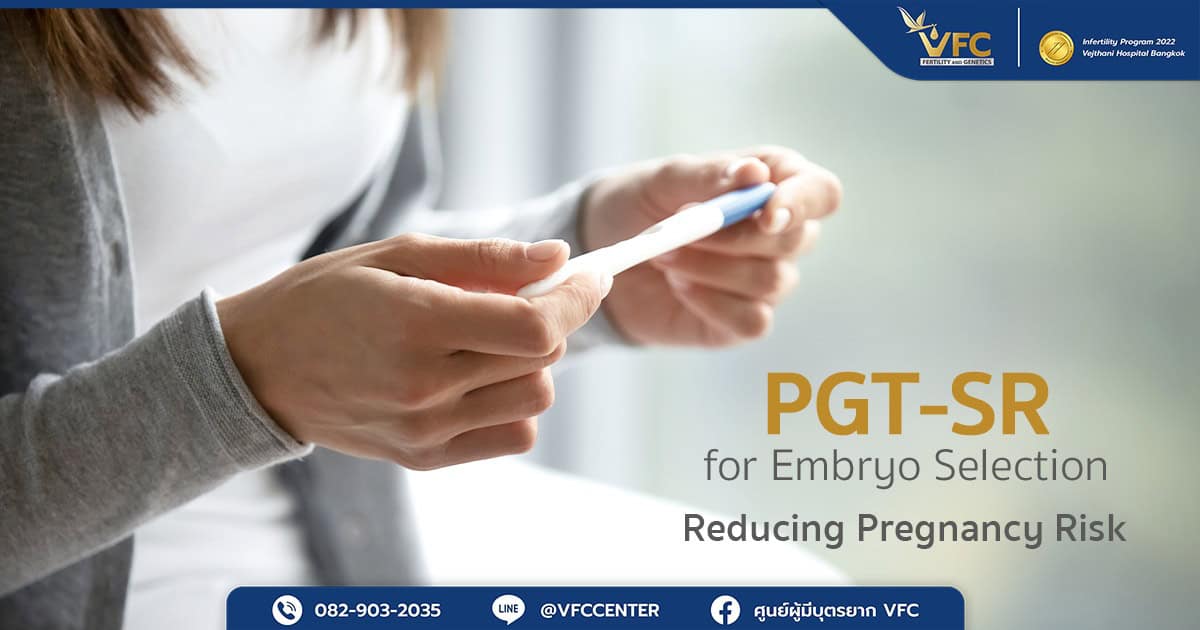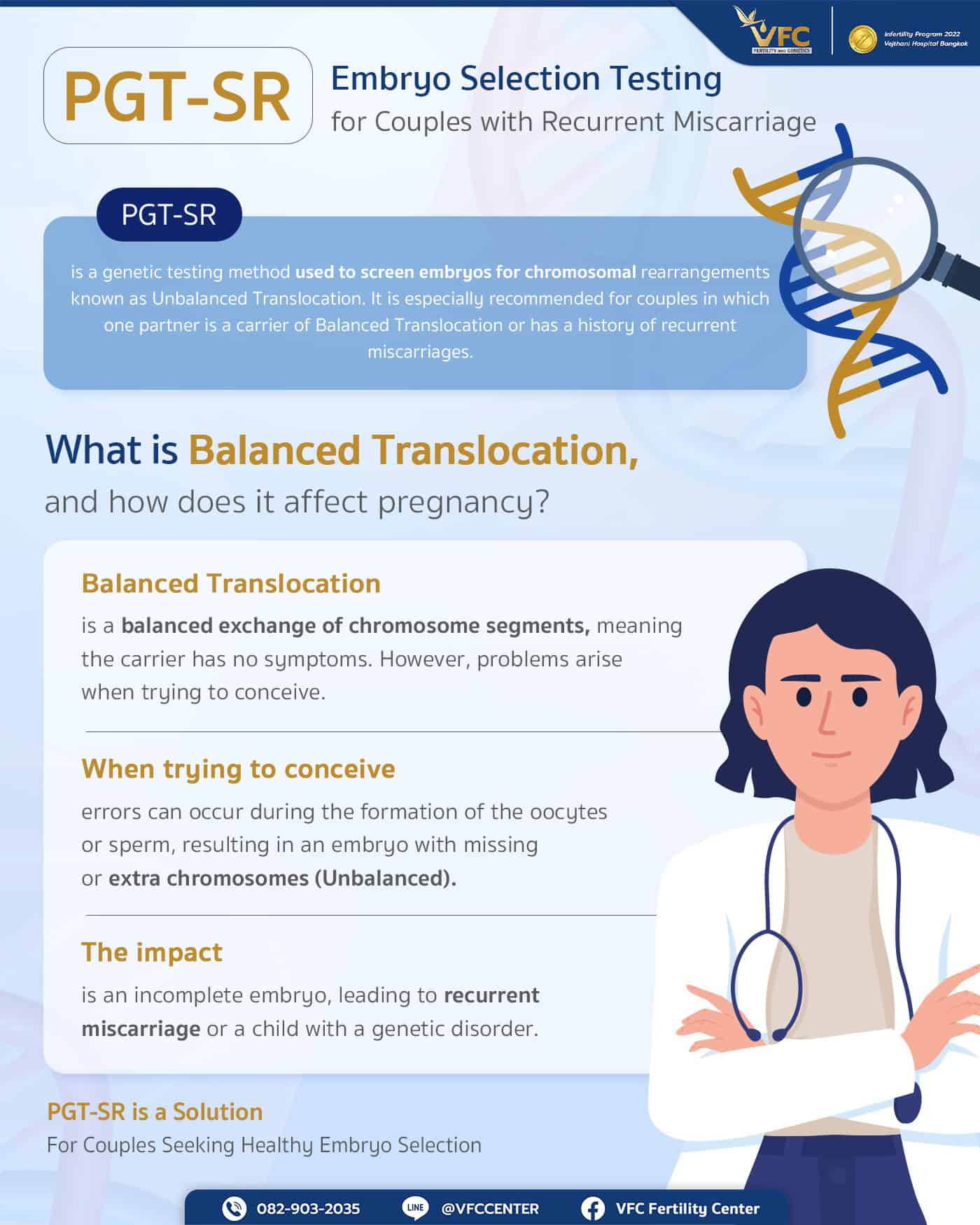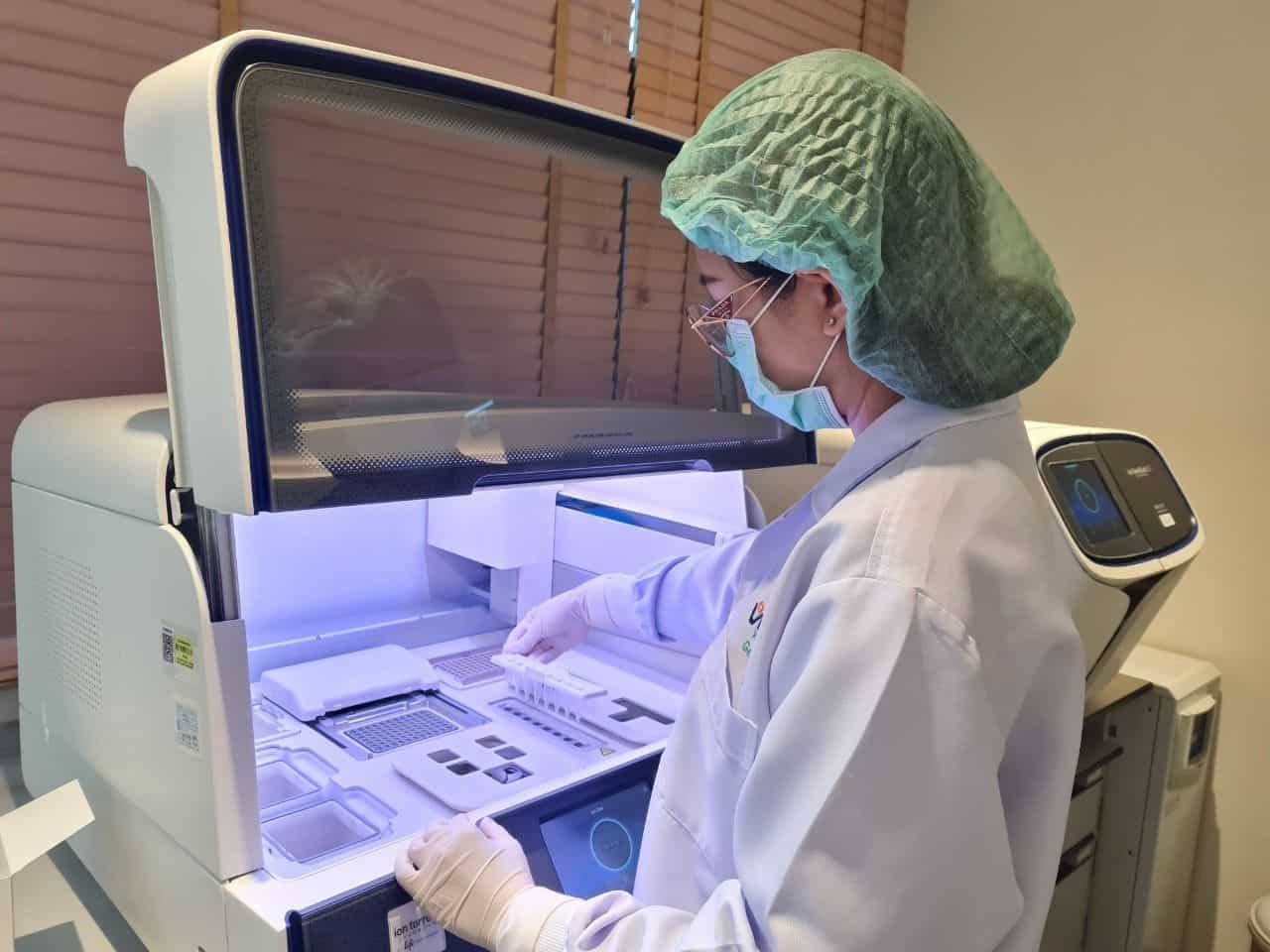

In an era where advances in medical technology play a crucial role in fulfilling the dreams of couples who wish to have children, PGT-SR has become an essential step in increasing the chances of a successful pregnancy and ensuring the birth of a healthy baby. This testing method is especially important for couples in which one partner carries a Balanced Translocation, a condition that may cause chromosome misalignment during embryo formation. Such errors can lead to Unbalanced Translocation, resulting in miscarriages or, in some cases, children born with a genetic disorder.
Understanding Genetic Causes of Infertility: What Is a Balanced Translocation?
For couples struggling with infertility or recurrent miscarriages, identifying the true cause is a vital first step. One common but often overlooked cause involves chromosomal abnormalities that may occur during embryo development, particularly when one partner is a carrier of a Balanced Translocation.
A Balanced Translocation occurs when pieces of chromosomes exchange places between two different chromosomes or are inverted within the same chromosome, without any loss or gain of genetic material (DNA). People with this condition typically show no symptoms and lead completely normal lives.
However, during the formation of reproductive cells (eggs or sperm), these rearranged chromosomes can misalign, producing embryos with extra or missing genetic material (Unbalanced Translocation). These embryos often fail to develop properly, resulting in miscarriage or, in some cases, a child with developmental or health abnormalities.
Schedule a consultation and testing to determine the cause of difficulty conceiving.
What Is PGT-SR? A Solution for Couples Facing Recurrent Miscarriages Due to Chromosomal Abnormalities
PGT-SR (Preimplantation Genetic Testing for Structural Rearrangements) is a form of embryo selection performed before implantation to identify chromosomal abnormalities caused by structural rearrangements such as Balanced Translocation or inversion in the parents. Even though carriers themselves are healthy, their embryos may contain abnormal chromosomal arrangements. PGT-SR helps distinguish embryos with Unbalanced Translocation from those that are normal or balanced before transferring them into the uterus. Benefits of PGT-SR include:
- Reduces risk of recurrent miscarriage by identifying and excluding embryos with abnormal chromosomes before implantation.
- Increases pregnancy success rates by selecting embryos with normal or balanced chromosomes that are more likely to implant successfully.
- Improves the chance of having a healthy baby by lowering the risk of passing on a genetic disorder.
Types of Preimplantation Genetic Testing: Which Method is Right for You?
While PGT-SR is one method to increase the chances of a successful pregnancy, many couples may have heard of other types of preimplantation genetic testing, leading to confusion about which to choose. Understanding the three main types of PGT currently available will help couples ease their worries and plan with their doctor confidently:
- PGT-M (Preimplantation Genetic Testing for Monogenic Disease): Focuses on testing specific genes in the embryo to screen for single-gene genetic disorders, such as Thalassemia or Cystic Fibrosis.
- PGT-A (Preimplantation Genetic Testing for Aneuploidy): Evaluates the embryo’s chromosomal complement across all 23 chromosome pairs to detect aneuploidies — gains or losses of whole chromosomes or large chromosome segments (for example, trisomy 21, also known as Down syndrome)
- PGT-SR (Preimplantation Genetic Testing for Structural Rearrangement): As mentioned, this test specifically targets cases where one parent is a carrier of a Balanced Translocation. Its goal is to separate unbalanced embryos from normal ones, increasing the chance of a successful pregnancy and a healthy baby.
The option of PGT method depends on the cause of the infertility or the couple’s genetic risk. PGT-M is the option for couples who know they are carriers or are at risk of passing on a single-gene disorder. PGT-A is suitable in general cases where screening for any missing or extra chromosomes is desired. Meanwhile, PGT-SR is a necessary option specifically for couples who are carriers of a Balanced Translocation.
Consult to plan the appropriate embryo selection testing.

The PGT-SR Embryo Selection Process
- Oocyte Retrieval and Embryo Culture: Embryos are created via the ICSI or IVF process. Embryos that develop to the blastocyst stage have a sample of cells removed for analysis.
- Chromosomal Analysis: Advanced technology is used to analyze the chromosomes, separating unbalanced embryos from normal ones.
- Appropriate Embryo Selection: Qualified embryos are chosen for transfer back into the uterus, increasing the chance of pregnancy and reducing the risk of a genetic disorder in the infant.
Purpose of PGT-SR: For a Healthier Future Child
The decision to undergo PGT-SR is a worthwhile investment for at-risk couples, offering several significant benefits:
- Selects the healthiest embryos: Enables physicians to identify embryos with normal (euploid) or balanced chromosomes, which are more likely to develop successfully.
- Reduces the risk of recurrent miscarriage: Since the leading cause of miscarriage among carriers of Balanced Translocation is unbalanced embryos, PGT-SR helps eliminate these early in the process.
- Increases the chance of a successful pregnancy: By transferring only embryos that are chromosomally normal and viable, couples have a higher likelihood of achieving a healthy, full-term pregnancy.
PGT-SR represents a major advancement for couples who wish to minimize risk and improve pregnancy success through careful embryo selection. At VFC Center (V Fertility Center), a leading PGT clinic in Bangkok, our specialists provide comprehensive reproductive care that includes genetic testing, hormonal analysis, and customized treatment plans.
By combining deep genetic insights with expert medical care, our multidisciplinary fertility team is dedicated to helping couples achieve their dream of a healthy, successful pregnancy.
Article by Dr. Wanakan Singhasena
Contact or Book a Consultation:
VFC Center – V-Fertility Center
Hotline: 082-903-2035
LINE Official: @vfccenter
Frequently Asked Questions (FAQ)
Q: What are the limitations of PGT-SR?
A: Although PGT-SR is a highly effective tool, there are certain limitations that couples should be aware of:
- It cannot distinguish whether an embryo is completely normal or a carrier of Balanced Translocation. The test only identifies embryos that are not Unbalanced.
- It may not detect very small genetic abnormalities, such as microduplications or microdeletions.
- It does not guarantee a 100% pregnancy success rate, although it significantly increases the likelihood.
- The procedure must be performed in conjunction with ICSI or IVF (Intracytoplasmic Sperm Injection).
Q: Is it necessary to perform PGT-SR on every embryo?
A: PGT-SR is only recommended for couples who know that one partner is a carrier of a Balanced Translocation or have a history of recurrent miscarriage suspected to be caused by a chromosomal abnormality. The doctor will determine which type of testing is appropriate for the couple to address the specific problem.
Q: Does PGT-SR pose any risk to the embryo?
A: The process of taking a cell sample from the embryo is highly safe and does not affect the development of a healthy embryo. This is because only a few cells from the outer Trophectoderm layer are removed for analysis, without disturbing the Inner Cell Mass (the cluster of cells that will become the fetus). This ensures that the risk of damage to the embryo is quite low and safe for the baby’s future development.

OBSTETRICS AND GYNAECOLOGY-REPRODUCTIVE MEDICINE





No Comments
Sorry, the comment form is closed at this time.